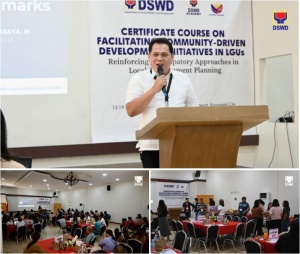
The Department of Social Welfare and Development (DSWD) Academy, in partnership with the National Program Management Office of the Kapit-Bisig Laban sa Kahirapan-Comprehensive and Integrated Delivery of Social Services (KALAHI-CIDSS), is conducting a Community-Driven Development (CDD) Training to reinforce the participatory planning process of select local government units (LGUs) nationwide.
“The role of CDD in the landscape of social welfare is crucial, yet, only a few manage to make use of this approach for development. It represents a fundamental shift towards giving communities the reins to identify, prioritize, and implement projects that directly affect their lives,” DSWD Field Office-12 (SOCCSKSARGEN) Regional Director Loreto Cabaya Jr said in his message during the opening program of the training on Monday (April 15) in Koronadal City.
Some 60 participants from LGUs nationwide that are new to the agency’s CDD flagship program, the KALAHI-CIDSS, were identified as trainees for the DSWD Academy’s Certificate Course on Facilitating Community-Driven Development Initiatives in LGUs: Reinforcing Participatory Approaches in Local Development Planning.
Emphasizing the importance of a participatory approach, Director Cabaya said the training program also shows the agency’s commitment to capacitate and empower LGUs which will “enable them to drive meaningful change in their respective communities”.
“DSWD would like to thank all LGUs for mainstreaming the community-driven development initiative in your LGUs, which was proven effective in reducing poverty, improving local governance, and empowering local communities,” Director Cabaya said.
The first batch of the CDD training is composed of local social welfare and development officers, planning officers, and local government operations officers from different non-KALAHI CIDSS LGUs in Ilocos, Eastern Visayas, Zamboanga Peninsula, MIMAROPA (Mindoro, Marinduque, Romblon and Palawan), SOCCSKSARGEN (South Cotabato, Cotabato, Sultan Kudarat, Sarangani, General Santos) and Cordillera Administrative Region (CAR).
The training, which will run until April 19, covers various modules and workshops on key concepts and critical processes in local development planning and participatory approaches and strategies for sustainable local development, among others.
In her message, Mary Ann Traspe, who represented the Department of the Interior and Local Government (DILG) Regional Director Atty. Rochelle D. Mahinay-Sero, emphasized the importance of the DSWD Academy’s CDD training course for the participants to value the vital role of the participatory approaches in local development planning.
“As you delve into this course, remember that you are part of a community of learners who are equally passionate about making a positive impact on their local communities. Together, you will explore strategies, exchange ideas, and gain valuable insights that will empower you to effectively facilitate development initiatives,” Dir. Mahinay-Sero said.
The CDD training is among the menu of trainings offered by the DSWD Academy, a pioneering project of DSWD Secretary Rex Gatchalian.
The DSWD Academy serves as the agency’s professional learning institute that offers opportunities for the development of the competencies of its partner stakeholders needed in the delivery of social welfare as well as social protection programs and services. #


